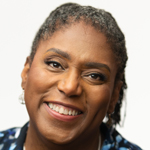Listen to Martha and Roxy discuss this ground-breaking course:
Do you ever feel uneasy talking about race, gender, or sexual orientation? Unsure how to address power differences, unearned advantages or racial oppression?
Avoiding conversations about domination and power is no longer an option. The pain of avoiding them shows up in our classes, our meetings, our workplace, and in our relationships.
Nonviolent Communication consciousness can give you the courage — and the ability — to address some of those deeply challenging issues.
If you've been walking on eggshells, feeling afraid of saying the wrong thing, and are ready for a change, join us for this powerful six-week MP3 download. You'll learn how to:
- Create brave, courageous space
- Cultivate behaviors that foster inclusion
- Free yourself from judgments
- Welcome all parts of all people
- Create shared reality about oppression
- Use clear observations to explore "isms"
- Understand how rank influences who gets to speak, take space, and determine the group's direction
- Expand observations to recognize historical patterns, micro-aggressions and fragility
- Raise awareness and choose strategies that meet more needs for more people
- Respond authentically to bias and stereotypes
- Address the impact of micro-aggressions
- Shift from a culture of shame to a culture of support
- Develop ease and agility when connecting across differences
- Engage empathically with people with more or less power
- Choose language to express that all needs matter
- Hold space for pain and mourning
- Intervene when we see hurtful patterns
- Interrupt for the sake of connection
- Unpack internalized oppression
- Shift from domination to partnership-based relationships
- Become a better ally
- Seek out marginalized voices and perspectives
- Confront your own discomfort and fragility with care
- Use your power to support marginalized movements
Addressing domination and oppression is often an intense, but deeply rewarding experience.
While some people may feel enraged and others prefer to avoid conflict of any kind, many prefer to address the issues with compassion. Sometimes they hear for the first time how difficult and costly it is to navigate the unfair advantages embedded in the system. Folks in power begin to confront their own unconscious bias and take responsibility for changing the system. Not only millennials, but many others take a stand for inclusion, collaborating in order to ensure that policies and behaviors support diversity, innovation, and teamwork.
So how do you embrace people from all walks of life and facilitate groups so that people are heard deeply, valued for their contribution and acknowledged for their unique experience?
Deep listening. Heart connection. Needs awareness. Real conversations. Clear requests.
In this MP3 series we'll explore ways of responding to bias, slights, and stereotypes.
For example, what do you do when someone in your workshop or meeting says:
- Where are you from? (Here.) Well, where are your parents from?
- I'm not even going to try to pronounce your last name.
- I don't see color.
- Women are more empathic than men. That's a fact.
- Anyone can afford to come to this program. It's free.
- You're from Asia right? How do Japanese people feel about this issue?
- This is a very safe neighborhood.
- Can't we just focus on how we are alike instead of how we are different?
- You need to check your privilege.
- Why does someone who looks like a woman get so upset when people can't remember to call her "they"?
- Hierarchy. It's pronounced HI-ER-AR-KY, not hi-ar-ky.
- There is only one race. The human race.
- All I said was she is beautiful. What's wrong with that?
- You are making a mountain out of a molehill.
- I want to share an African proverb...
- This program would be better in English only. Translation takes too much time.
What's challenging about hearing these questions and statements for you? What might be painful for others?
Questions you can ask yourself:
- Instead of calling people out by shaming them, how do we call them in to the dialogue?
- Rather than claim that systems are based on meritocracy, how do we identify our own unearned advantages and make the system more equitable?
- How do we shift from fragility and defensiveness to become courageous allies?
- What is western privilege and how do we honor the needs of all?
- What do we need to know about working in the global south if we are from the global north?
Not only will we explore how to change our language and behavior; we'll also look at changing our social systems.
For example, the starting line is not the same for everyone.

© Interaction Institute for Social Change | Artist: Angus Maguire
How do we ensure that historically underrepresented populations have access, a voice, a place at the table, and opportunities to take leadership?
NVC helps us have honest conversations and look beyond diversity to focus on inclusion and change.
To change the culture, we need to ask the difficult questions:
- Who is empowered?
- Who is included in decision-making?
- Whose needs matter?
- What happens when some people have a voice and others do not?
- How do we go beyond tolerance and truly value differences?
- How do we create an environment where everyone can show up authentically?
We can lean on the framework of NVC to create space for courageous conversations about systems. When people engage in developing their own understanding of issues and solutions, they connect and take action. They take a stand against systems of oppression and power-over. They engage in openhearted, practical conversations about inclusion — and they step into the challenging work of changing the systems and the culture.
Who Will Most Benefit From This MP3 Audio Download:
This program is for trainers, facilitators, teachers, people who hold meetings, and leaders of all kinds who want tools for inviting greater diversity and inclusion to their work.
Recording Information
- Time Investment: 6 - 8 hours (Mark, please clarify!)
- Date: Recorded in 2018
- Additional Materials: Includes PDF handout (Mark?)

 Roxy Manning PhD, CNVC Certified Trainer
Roxy Manning PhD, CNVC Certified Trainer Martha Lasley, MBA and CNVC Certified Trainer
Martha Lasley, MBA and CNVC Certified Trainer